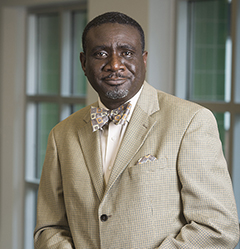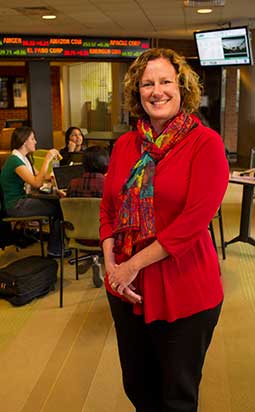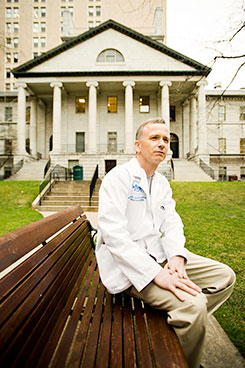UAB Magazine Weekly Subject Index
UAB Psychiatrist Reaches Out to Mothers, Children in Africa
By Matt Windsor
 UAB psychiatrist Tolu Aduroja maintains a close connection to his native Nigeria. Since 2011, he has returned to his hometown of Ibadan each fall to provide free health care through an organization he founded called Maternal Cords.As a boy, Tolu Aduroja, M.D., M.P.H., longed for the days when he got to go to work with his mother, an obstetric nurse at the hospital in Ibadan, Nigeria. "I saw patients give birth and the joy on their faces, and I just loved it," says Aduroja, an associate professor in the UAB Department of Psychiatry who specializes in child and adolescent psychiatry at UAB and Children's Hospital of Alabama. "I wanted to do that."
UAB psychiatrist Tolu Aduroja maintains a close connection to his native Nigeria. Since 2011, he has returned to his hometown of Ibadan each fall to provide free health care through an organization he founded called Maternal Cords.As a boy, Tolu Aduroja, M.D., M.P.H., longed for the days when he got to go to work with his mother, an obstetric nurse at the hospital in Ibadan, Nigeria. "I saw patients give birth and the joy on their faces, and I just loved it," says Aduroja, an associate professor in the UAB Department of Psychiatry who specializes in child and adolescent psychiatry at UAB and Children's Hospital of Alabama. "I wanted to do that."
Aduroja graduated from medical school at the University of Ibadan and began work as a general practitioner, but love brought him to the United States in 1997. His wife, a pharmacist who was born in the U.S. and moved to Nigeria as a high schooler, had a great job offer in Atlanta. Aduroja took the opportunity to expand his horizons. "When I came to the U.S., my mind was made up that I wanted to work with people," he says.
He began a medical residency in psychiatry in Atlanta while starting a master's degree in public health at UAB. "The courses were offered on the weekend, so I would shuttle back and forth between Atlanta and Birmingham," Aduroja says. He eventually moved to Birmingham to complete a fellowship in child and adolescent psychiatry at UAB, joining the faculty of the Department of Psychiatry in 2005, the same year he received his master's degree in public health.
Home Again
Joy drew Aduroja to the medical profession, but pain brings him back to Nigeria. "You have to have money to get health care in Nigeria," he says. "People know something is wrong, but they don't do anything about it until it is too late."
UAB Entrepreneurs Connect Alumni Online
By Tara Hulen
 Molly Wasko launched inDegree as a
Molly Wasko launched inDegree as a
way for universities to use social media
to enhance alumni networks.For UAB School of Business associate professor Molly Wasko, Ph.D., LinkedIn is more than a social media site for professionals. She views it as a rich source of data for her research into the development of online communities—and a business opportunity that could benefit universities, their students, and their alumni.
The result is inDegree, an alumni tracking service that helps universities find and connect with graduates and collect a range of useful information from LinkedIn profiles. InDegree won the grand prize of $100,000 in seed money in the 2012 Alabama Launchpad business plan competition, a program of the Economic Development Partnership of Alabama Foundation.
Wasko, chair of UAB’s Department of Management, Information Systems, and Quantitative Methods, started inDegree with Alex Miningham, one of her M.B.A. students at Florida State University, where she taught prior to UAB. The two had worked on a similar idea after Wasko started using her own LinkedIn profile as a sort of research project. Soon, an unmet need became obvious. “I noticed that everybody (at the university) was coming to me to find out about alumni networks,” Wasko says. “I noticed it was a very powerful tool for staying connected to our alumni and helping our current students network with the alumni who came before them.”
Building Business Intelligence
Universities face a challenge in staying up to date with students and alumni as information about them gets thinner and less accurate over time, Wasko says. She saw the self-maintained profiles on LinkedIn as a potential way for collecting and maintaining accurate data.
“We are a trusted third-party data integrator that provides business intelligence for universities,” says Wasko, who oversees the technology that powers the service. “We can match your alumni database to LinkedIn profiles. Our primary customer is the dean or associate dean in a business school who is in charge of tracking outcomes for accreditation.”
InDegree also can gather permission from alumni to allow universities to tap into personal profiles for additional information, such as resumes, that aren’t visible on public pages. By granting that permission, alumni can show their degrees as verified by their universities, and they can easily connect with other verified alumni by searching by degree type, specific job, location, or other criteria.
“We want students and alumni to use their LinkedIn profile as their alumni profile so they have to maintain information in only one place,” she says. “We are trying to make that strong university tie available and actionable to our students and alumni, which gives them a value proposition where it’s worth staying connected.”
Branching Out
Because the social media world constantly evolves, Wasko says inDegree is looking at an array of networking technologies. Particularly promising is BranchOut, a business-focused app that allows Facebook members to quickly form a professional networking page using job-related information from their profiles—while excluding less professional postings.
In April 2013, inDegree was purchased by HEPdata, Inc., a provider of matching gift data and data enrichment services designed specifically for non-profit organizations, says Wasko. inDegree’s services give university clients a “seamless solution” for advancement and development efforts by appending updated employment data to records, in addition to HEPdata’s other offerings, Wasko explains.
inDegree is now in use at the UAB School of Business, where it is used for tracking placements for national accreditation. It is also used by Lisa M. Schwiebert, Ph.D., associate dean for postdoctoral education in the UAB Graduate School, to maintain a database of postdoctoral alumni—a “pretty amazing group” that has been hard to track to gather information, Wasko says. From there, Wasko will present to other groups on campus to see if they are interested in using the service.
Wasko says that the Alabama Launchpad prize has helped position inDegree as an emerging industry standard for tracking the student placement and career success outcomes required by most accrediting bodies for higher education. For more details, visit indegree.com.
UAB Alumna and Genetics Pioneer Dies at 82
By Bob Shepard
 UAB professor emerita Sara Will Crews Finley, M.D., passed away on February 20, 2013. Finley, along with her husband, Wayne H. Finley, M.D., Ph.D., co-founded the first medical genetics program in the southeastern United States at UAB. She was co-director of the Laboratory of Medical Genetics for 30 years.
UAB professor emerita Sara Will Crews Finley, M.D., passed away on February 20, 2013. Finley, along with her husband, Wayne H. Finley, M.D., Ph.D., co-founded the first medical genetics program in the southeastern United States at UAB. She was co-director of the Laboratory of Medical Genetics for 30 years.
Finley held the Wayne H. and Sara Crews Finley Chair in Medical Genetics at the time of her retirement from UAB in 1996. The Finleys founded the first chromosome laboratory in the Southeast and began what was to become one of the country’s largest university prenatal genetics laboratories.
“Sara Finley was a true pioneer in medicine,” says Bruce Korf, M.D., Ph.D., chair of UAB’s Department of Genetics and current holder of the Finley Chair in Medical Genetics. “She and her husband, Wayne, were among the first physicians to recognize the importance of the new field of medical genetics, and they were among the first to implement new technologies for culturing cells and analyzing chromosomes. These technologies helped untold numbers of families by providing new approaches to the diagnosis and classification of birth defects and genetic disorders, as well as enabling genetic counseling for families.”
Born February 26, 1930, Finley was the daughter of Jessie Mathews Crews and J.B. Crews of Lineville, Alabama. She graduated from Lineville High School, the University of Alabama, and the Medical College of Alabama. Her postgraduate training included an internship at Lloyd Noland Hospital, a three-year pediatric research fellowship at the Medical College of Alabama, and a traineeship at the Institute for Medical Genetics at the University of Uppsala, Sweden.
Alumnus Boosts Nation’s Drug Defenses
By Matt Windsor
 Michael Callahan, an alumnus of the UAB schools of Medicine and Public Health, has pioneered revolutionary methods of producing vaccines and predicting and reacting to virus outbreaks. Photo: Joseph Ferraro, Massachusetts General Hospital
Michael Callahan, an alumnus of the UAB schools of Medicine and Public Health, has pioneered revolutionary methods of producing vaccines and predicting and reacting to virus outbreaks. Photo: Joseph Ferraro, Massachusetts General Hospital
If there is trouble somewhere in the world, Michael V. Callahan, M.D., DTM&H, M.S.P.H., probably isn’t far away. For three months every year, Callahan, a 1991 graduate of the UAB School of Public Health and 1995 graduate of the UAB School of Medicine, works in the Division of Infectious Diseases at Massachusetts General Hospital. The rest of his time is spent on the move.
Callahan has been on the scene at some of the world’s most famous—and dangerous—virus outbreaks, including H5N1 avian flu in Hong Kong in 1999 and 2001, SARS in Hong Kong in 2003, Marburg in Angola in 2004, and so on. He also has responded to recent Ebola virus outbreaks in the Democratic Republic of the Congo, Lassa fever in Nigeria, and controversial laboratory accidents resulting in the infection of scientists at foreign biohazard laboratories.
But Callahan’s most enduring contribution to health care may come from the lab rather than the field. Since 2005, he has been a program manager for the Defense Advanced Research Projects Agency (DARPA), the secretive R&D center of the American military. Callahan was recruited to DARPA “to work on fast-paced solutions to health threats,” he says. His biggest mission: Create a government-funded drug research and production capability focused strictly on national priorities, such as defense and pandemic preparedness, rather than profits. “The Department of Defense had no idea how to make drugs, and neither did I,” Callahan recalls. But they knew they needed to learn how.